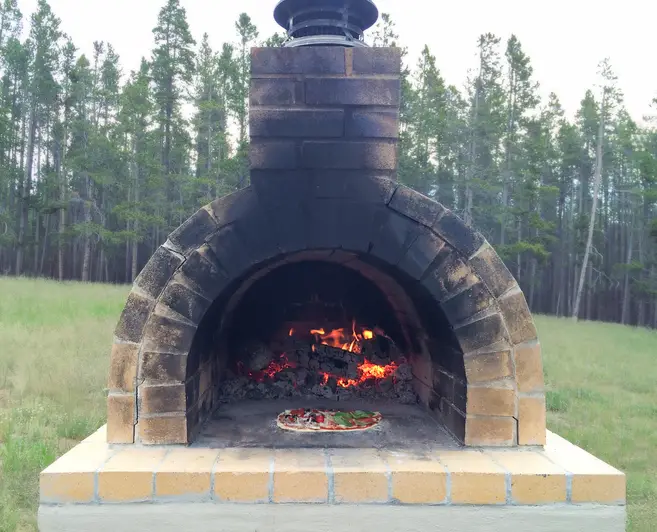
Pizza ovens have become increasingly popular in recent years for commercial use and backyard cooking at home. With the rise in popularity of wood-fired and brick ovens, many people have questions about the smoke they produce. Specifically, do pizza ovens create a lot of smoke?
Wood fired pizza ovens will create smoke at low temperatures while the oven is warming or cooling, or if the wrong kind of wood such as pine is used as fuel for the fire. Wood-fired and brick ovens can produce more smoke than gas-fired ones, but there are also ways to minimize smoke production in all pizza ovens.
Let’s dive into the various factors that can impact the amount of smoke produced by a pizza oven and explore how to reduce smoke when cooking with these appliances.
Do Pizza Ovens Smoke When Cooking Pizza?
When it comes to cooking pizza, the smoke produced by a pizza oven will depend on the fuel used. Wood-fired and brick ovens, which use wood or charcoal as a fuel source, will naturally produce more smoke than gas-fired ovens. This is because the wood or charcoal is burned to create heat, and the combustion process produces smoke as a byproduct.
The amount of smoke produced by a wood-fired or brick oven can be minimized through proper use and maintenance. One key factor is the type of wood or charcoal being used. Hardwoods, such as oak or hickory tend to burn more slowly and produce less smoke than softer woods like pine or cedar. Choosing a hardwood fuel and properly seasoning it (allowing it to dry out for at least six months before use) can help reduce the amount of smoke produced.
Another important factor is how the wood or charcoal is ignited and burned. Starting a fire with a small amount of kindling and gradually adding larger pieces of wood can help reduce smoke, as can using a fire starter rather than lighter fluid. Additionally, maintaining a hot, efficient fire by removing ashes and keeping the fuel bed at the proper level can help minimize smoke production.
Gas-fired pizza ovens do not produce smoke when cooking pizza because they use a gas flame rather than burning wood or charcoal. Gas-fired ovens can produce smoke if there is a problem with the gas line or if the oven is not properly ventilated. If a problem is identified with a gas fuel source, that fuel source should be shut off immediately and the gas let to clear. You can find the leak using the soap solution method and deal with it appropriately.
Do Pizza Ovens Smoke When Cooking Other Foods?
Pizza ovens can be used to cook various foods beyond just pizza, and the smoke produced when cooking these other dishes will depend on the type of fuel used and the way the oven is used.
For wood-fired and brick ovens the same factors that impact smoke production when cooking pizza also apply when cooking other foods. Choosing a hardwood fuel and properly seasoning and burning it can help minimize smoke production. Additionally, the type of cooked food can affect the amount of smoke produced. For example, fatty meats or greasy foods can produce more smoke because the fat drips onto the wood or charcoal and creates additional smoke as it burns.
Gas-fired ovens don’t produce smoke from the fuel source, but can smoke from burning food dripping on the stone or in the pan.
Do Gas-Fired Pizza Ovens Smoke and When?
Unlike wood-fired ovens, gas-fired pizza ovens do not produce smoke when used for cooking any type of food, including pizza. This is because they use a gas flame rather than burning wood or charcoal, so there is no combustion process and, therefore, no smoke.
However, a gas-fired oven can produce smoke if there is a problem with the gas line or if the oven is not properly ventilated. This could occur if the gas line is leaking or the oven is used in a poorly ventilated space, such as a garage or basement. In these cases, it is important to address the issue and ensure proper ventilation to prevent smoke from accumulating.
Do Wood-Fired Pizza Ovens Smoke and When?
Wood-fired pizza ovens will produce some amount of smoke when burning wood as a fuel source. The amount of smoke produced can vary depending on the wood used and how it is burned. Hardwoods such as oak and hickory will produce less smoke than softer woods like pine and burning the wood in a controlled manner can also help to reduce the amount of smoke produced.
It’s worth noting that wood-fired pizza ovens do not constantly produce smoke while they are in use. The amount of smoke produced will depend on how much wood is burned and how often the wood is added to the fire. For example, if the wood is being added continuously to maintain a consistently high heat, the pizza oven will produce more smoke. On the other hand, if the wood is added in smaller amounts as needed to maintain consistent heat, the pizza oven will produce less smoke.
Wood-fired pizza ovens typically produce more smoke when they are first being lit and as the wood is added to the fire. This is because the wood is not yet fully burnt and releases smoke as it burns. Once the wood is fully burnt and the fire has reached a consistent temperature, the amount of smoke produced will decrease. The amount of smoke produced by a pizza oven depends on the fuel used and how it is used. Gas-fired ovens do not produce smoke when cooking any type of food but can produce smoke if there is a problem with the gas line or if the oven is not properly ventilated. Wood-fired and brick ovens, which use wood or charcoal as a fuel source, will naturally produce more smoke than gas-fired ovens. However, smoke production can be minimized through proper use and maintenance, such as choosing a hardwood fuel, properly seasoning and burning it, and maintaining a hot, efficient fire.
With a few good choices, you can enjoy a wood-fired pizza’s delicious, smoky flavors without creating excessive smoke.

